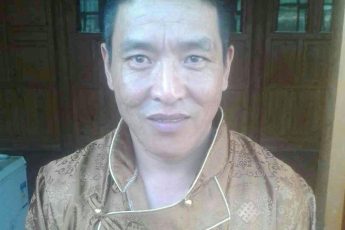 By Lhadon Tethong (first published in January 2011)
By Lhadon Tethong (first published in January 2011)
I was attending the World Social Forum in Brazil when the Chinese government executed Lobsang Dhondup and sentenced Tenzin Delek Rinpoche to death. I was checking my email in a small cybercafe in Porto Alegre, surrounded by activists from across the globe, when I heard the news. At first, I just sat there. Stunned. Moments later, I couldn’t fight it back, and I wept. Then, I resolved to fight. It was a defining moment for me as a young Tibetan activist.
Up until that moment, I had somehow been convinced that the Chinese wouldn’t go through with it. They hadn’t dared to execute a Tibetan in such an overtly political and high-profile way for nearly 20 years, not to mention the incredible amount of unwanted attention and government pressure the Chinese were facing as a result of the global outcry and campaign in support of the two men. I was sure it was helping. Unfortunately, I was wrong.
 On January 26th, 28-year old Lobsang Dhondup was executed, likely with a bullet to the head, and Tenzin Delek Rinpoche’s death sentence was upheld, with a two year reprieve. Lobsang’s relatives never got to see his body. Only his ashes were returned to them.
On January 26th, 28-year old Lobsang Dhondup was executed, likely with a bullet to the head, and Tenzin Delek Rinpoche’s death sentence was upheld, with a two year reprieve. Lobsang’s relatives never got to see his body. Only his ashes were returned to them.
Looking back on that day now, I see how naive I was to think that the Chinese authorities didn’t have the stomach for the fight – that they would somehow be unwilling to risk the negative press and global condemnation – and therefore wouldn’t carry out the sentences. I guess at that time, despite all I knew of their cruelty, all of the horror I had heard about since I was a small child, I had to learn this lesson and never forget it.
Though the Chinese government proved me wrong in my judgment that day, I was neither defeated nor hopeless. In fact, their brutal and heartless treatment of these two innocent Tibetan men only increased my determination to work harder and my conviction in the justice of this fight. And fight we did. In the campaign to stop Tenzin Delek Rinpoche’s execution in the years that followed, we did everything we could possibly think of – from street protests and direct actions at Chinese embassies & consulates, to online advocacy campaigns and government lobbying – to gain global public and political support, and to inspire people to take action.
In the end, on January 26, 2005, the Chinese government commuted Tenzin Delek Rinpoche’s sentence to life imprisonment for what they said was “good behavior” while in prison. Call it whatever they like, we knew why they did it. And though we were not able to help Lobsang Dhondup, I truly believe we saved Rinpoche’s life. This is the most important lesson.
We can make a difference. We must fight. We might not win every battle, but we must always try.
We did our best for Rinpoche then, and we must do it again now. And never ever give up.







Leave a Comment